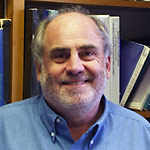Peter Pella is the W.K.T Sahm Professor of Physics at Gettysburg College. Participating in research at the Indiana University Cyclotron Facility, the Bates Linear Accelerator Facility, and the Thomas Jefferson Continuous Electron Beam Accelerator Facility in medium-energy nuclear physics, his work includes the study of the spin response of the nuclear force and fundamental properties of the neutron. He is also involved in issues related to nuclear weapons: as a William Foster Fellow (1994-95), he worked at the United States Arms Control and Disarmament Agency, from which he received a meritorious honor award for his service in achieving the indefinite extension of the Treaty on the Non-Proliferation of Nuclear Weapons (NPT), and at the Bureau of Nonproliferation, U.S. Department of State, from 2000 to 2001. He holds a Ph.D. in experimental nuclear physics from Kent State University, an M.S. in experimental nuclear physics from Rensselear Polytechnic Institute, and a B.S. in nuclear engineering from the United States Military Academy at West Point.
On May 11, 1995, the Treaty on the Non-Proliferation of Nuclear Weapons was extended indefinitely. One hundred and ninety nations have joined the treaty with the goal of preventing the spread of nuclear weapons and achieving nuclear disarmament.
“I had this feeling that since the previous generation of nuclear physicists had built these weapons, that maybe I should be working on trying to get rid of them,” said Peter Pella, who helped achieve the indefinite extension of the treaty while working at the United States Arms Control and Disarmament Agency. Reflecting on the process, he observed, “It was just an amazing but complex and rewarding process in the end.”
As physicist, a conflict resolution specialist, and an expert in arms control, nonproliferation, and disarmament, Pella believes strongly in the essential role science must play in informing the public about the policies that will help us develop lasting solutions to many of our world’s most pressing problems.
Science education for the next generation
Pella developed an interest in nonproliferation issues during his undergraduate studies of nuclear engineering at the United States Military Academy at West Point. After serving in the military for three years, Pella returned to West Point as the director of physics laboratories. During this time he taught classes and realized that he had as much passion for education as he had for physics. He set out to earn a doctorate at Kent State University and spent time conducting research in experimental nuclear physics at small accelerators across the country before becoming a professor.
Pella’s interest in nuclear proliferation issues, paired with a desire to get non-science students into the physics building, inspired Pella to design a course on nuclear weapons for non-science students that he has continued teaching since 1983. This course, which he now teaches at Gettysburg College, has developed into a nuclear weapons policy course about both the scientific principles of nuclear weapons and the policies surrounding nuclear weapons and arms control. His goal is to educate students on what is happening in the world in terms of nuclear weapons, nuclear security, and weapons policy. Pella even brought a delegation of his students to a mock Non-Proliferation Treaty Review Conference, which was sponsored by the Osgood Center for International Studies.
“The best part of my career is interacting with the students,” he said. “They always find new and exciting ways to challenge you. They really keep you on your toes.”
Empowering the public
Although Pella plans to retire from teaching at the end of this academic year, his legacy will continue through his written works. He has written a textbook for his course, Nuclear Weapons, Policy, and Strategy: The Uses of Atomic Energy in an Increasingly Complex World, and he has contributed two chapters to the Oxford International Encyclopedia of Peace.
While Pella hopes he will inspire a greater appreciation for science in his students and those that follow, his passion for education extends beyond the college classroom. He believes in bringing information and knowledge to the general public about current issues at the intersection of science and policy, and he’s been involved in organizing events for his community of Gettysburg, Pennsylvania, on international nuclear security. When Obama was elected, Pella gave a lecture to more than 200 community members on the administration’s nuclear weapons posture. “When something important comes up, I try and reach out to at least the local community to try and make sure they’re aware of what’s going on,” he explained.
When it comes to scientists engaging in public debate and policy, Pella is adamant on the importance of getting involved and contributing an evidence-based perspective: “I think the more we get into the public and let people know what we believe and the basis for it—well, that can’t be anything but helpful.”
